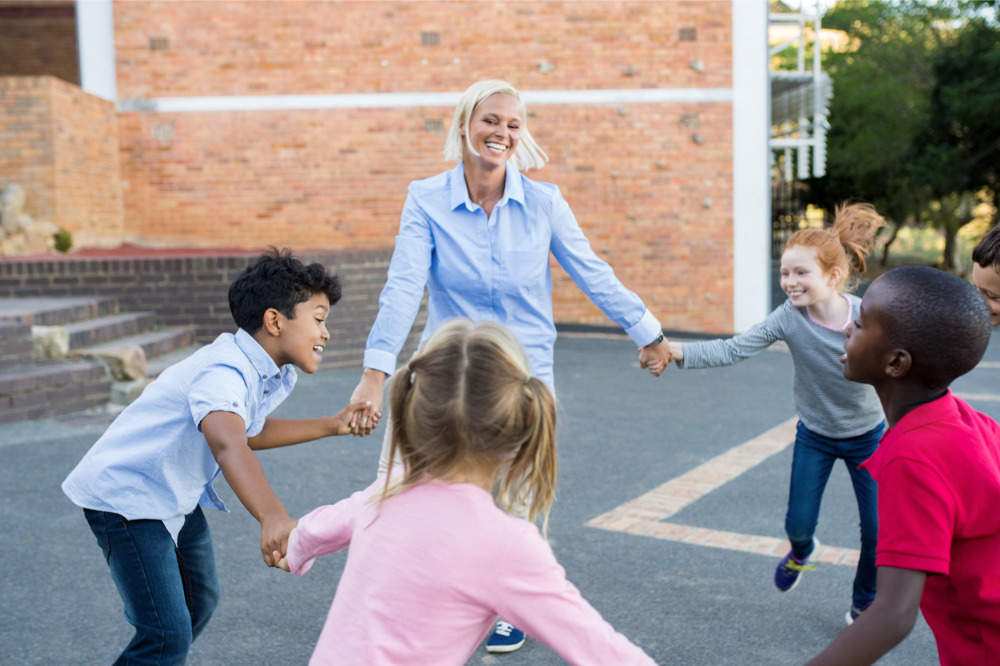
Multiple reports over the last 18 months have shown how social isolation resulting from COVID-19 restrictions and school closures can adversely impact the mental health and wellbeing of children.
Recognising this, governments have invested heavily in mental health programs for schools to tackle this issue. However, some experts say that something as simple as giving children more time to play and socialise can make a big difference to their health and wellbeing.
According to ACU Associate Professor Miriam Tanti and fellow ACU education expert Dr Chrissy Monteleone, an extension of recess and lunch breaks will help students re-engage with their school friends and build social skills when they return to school in Term 4.
“Tragically, recent studies show that young Australians are really struggling with their mental health,” Associate Professor Tanti said.
“During the last weeks of the school year, teachers should focus on giving their students a sense of joy and fun towards their learning experiences and consider extending break times. Teachers should be stripping back the curriculum, focusing on a smaller set of outcomes.”
A major report by the LEGO Foundation, which looked at 26 studies of play from 18 countries, found that learning through play can close achievement gaps between children from more and less advantaged groups, helping all children develop the breadth of skills they will need throughout their lives.
In an interview with the Educator following the release of the report, Finnish educator, author and scholar, Professor Pasi Sahlberg, said enabling more play for children can have powerful social, emotional and academic benefits.
“Educators and paediatricians both agree that play is important for children’s development and learning,” Professor Sahlberg told The Educator.
Professor Sahlberg said that while Australia may be a bit late to the play party compared to others, it has more world-class experts and passionate practitioners pushing play back to the childhood agendas in schools and homes than most of us know.
“The problem is that the Aussie play community is currently not well organised, and collaboration is based on ad-hoc initiatives,” he said.
“I see many more schools stepping forward now to seek support in their efforts to increase play time for all children in their schools”.
Professor Sahlberg said the Gonski Institute for Education’s research shows that vast majority of Australian parents are ready for having more play in schools.
“I see a tipping point on the horizon, not too far away, when we will recognise how play is integral to children’s education, wellbeing and success in life”.
Associate Professor Tanti agrees that recognising the importance of play and helping students rebuild their social and emotional skills is critical as schools prepare to return in October.
“The purpose of education is not just to develop mathematics and literacy content knowledge and skills but also the holistic development of each child, which post-pandemic, should be largely centred on social and emotional wellbeing and self-confidence,” she said.
“Understandably parents are anxious about their children falling behind in school studies, but these are exceptionally difficult times which require very specific teaching approaches. Upon return to classrooms, teachers will know exactly where their students are and what they will need.”
Parents need to trust teachers
Fellow ACU education expert Dr Chrissy Monteleone encouraged parents to join in on the fun and encourage their child to practice wellbeing.
“An extension of recess and lunch break, resulting in less structured class time, is beneficial for children who have been in extended lockdowns and will help them to re-engage with school friends and build their social skills,” Dr Monteleone said.
“A focus on practical subjects such as music, visual arts, drama, dance, technologies workshops, languages, personal development, health and physical education represent valuable educational opportunities for play-based activities.”
Hybrid learning should continue
Associate Professor Tanti and Dr Monteleone said that while the return to face-to-face learning should be welcomed, teachers should maintain remote learning tools which give students autonomy and choice. Examples of these include short video recordings of explicit teaching instruction and the use of learning management systems that house resources and allow for both collaboration and teacher feedback.
Parents were encouraged to practice a calm and reassuring manner and reinforce strategies which help their child to manage their emotions.
Associate Professor Tanti said that children will behave in unique and diverse ways when returning to school.
“Some children will be excited to return to school and see their teachers and peers, others will demonstrate anxiety to return to school,” she said.
“That’s why it is important for parents to speak with teachers where there is a concern, so their child’s transition back to school is a positive one.”


